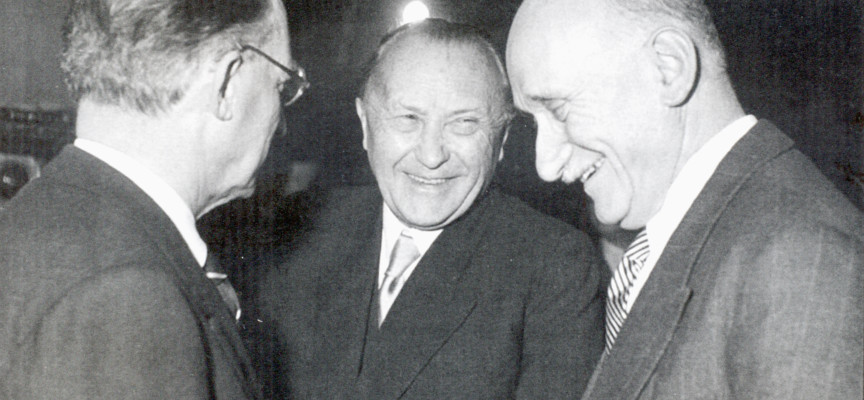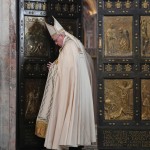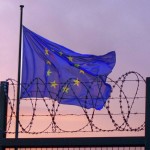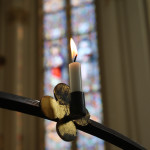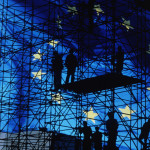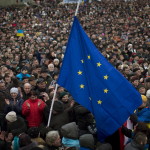“One word that I liked, I liked it – I don’t know who approves of it and who doesn’t – is ‘the reestablishment of the European Union’. I thought of the great Fathers. But today, where is there a Schuman, an Adenauer? These were great men who after the war founded the European Union. And I like this notion of reestablishment: if only it could be done! I wouldn’t call it the only one, but Europe has a strength, a culture, a history that must not be wasted, and we have to do everything possible so that the European Union may have the strength and also the inspiration to make us move forward”. So spoke Pope Francis in the now customary meeting with journalists during his return flight from Mexico, answering to a journalist of a German agency.
It’s the fourth time since the beginning of his Petrine ministry that Pope Francis has cited the names of the great “Fathers of Europe”. In the latest circumstance, he forgot to mention the Italian De Gasperi, but he had joined him to the names of Adenauer and Schuman in previous times.
The Pope regrets the absence of leaders in Europe today who have the inner strength, the firm conviction and prophetic audacity of the three who interpreted the postwar history with the eyes of believers, as well as with the competence that resulted from study, reflection and the suffering endured during the Fascist and Nazi dictatorships. The Lord of history even today certainly gives our continent men aware of their vocation, consistent between what they declare and what they seek to accomplish, expert in choices for the common European good. These men are depreciated by the states because the latter prefer to use in the European policy dull and foolish figures that do not overshadow national policies and whose reputation seems to be demanded more than their dignity, their image more than their action, their success obtained not with the meeting, but with the clash.
The European project of the “Three” was based on values, ideas and projects, not on purely mercantilist relationships. The economic union was only the beginning of a journey that was to lead to political integration. Today we see instead a Europe in which it seems that everything can be achieved with strong finance, with an economy reachable at a low price, with the search for non-unanimous policies, but at most bilateral. On the contrary, Europe must feel the need to ensure greater social justice in a world that is increasingly dominated by the idolatry of profit as an end in itself, which generates greater concentration of wealth and more and more widespread poverty.
Four were the key ideas of Adenauer (from the German Rhine region), of De Gasperi (from the Italian Trentino) and Schuman (from the French Moselle region): to ensure peace in Europe, countries had to be aware of belonging to a common destiny. Today we are witnessing the emergence of nationalistic forces, which attribute the cause to the “invasion” of people who flee from wars and poverty and seek solidarity in a European welcoming refuge. Europe has to find today “strength” and “inspiration” to deal with the phenomenon of migration in a unanimous background even at the cost of promoting the exit of countries which with their short-sighted policy only contribute to the dissolution of the unitary dream.
The Founding Fathers saw in a united Europe not only the cradle, but the “guardian” of democracy, which – as Schuman writes – “owes its existence to Christianity. It came to light the day when the man was called to realize in his temporal life the dignity of the human person, in individual freedom, in the respect for the rights of each individual and the practice of fraternal love toward all”. Today Europe is suffering of a democratic deficit. Suffice it to say that the important decisions are made in the “executive federalism” and the European Parliament cannot often express the opinion of the peoples. Today more than ever we must educate to participation.
Today more than ever we must create beliefs to legitimize European institutions blocked by bureaucratic elephantiasis. Today more than ever we must bring Europe closer to citizens.
Political unity, which was to be realized fully in a federation of states, did not mean (and still does not) the negation of the homeland and the absorption of national sovereignty, but was to be achieved through small steps towards the abolition of borders. These should no longer be an obstacle to the exchange of ideas, people and goods. Today we are practically witnessing the end of the Schengen treaty. Europe creaks, but it is the specter of this possible catastrophe that must make us rediscover the spirit of the Founding Fathers.
“Europe – says Pope Francis – has a force, a culture, a history”. Its strength derives from the universality of the values of its humanism. The same European culture has common traits that we can grasp in the concept of person, which is the end and never a means; the differences are riches that must be defended because they all belong to a largest identity. It has a history that began in Jerusalem, from which it has inherited the Law of Sinai and the Beatitudes, in Athens, from which it has learned to rule the polis with democracy, in Rome, from which it took over the meaning of right and then continued with the spread of Christianity, with the construction of cathedrals, with the Enlightenment and, in the last century, with aberrant ideologies.
Today, Europe is in search of its soul. There is no gap that cannot be filled. To all those whom God loves, to those who believe to be non-believers, to the Christians is the great task of bringing to fruition what Adenauer, De Gasperi and Schuman began.
“Una parola che mi è piaciuta, mi è piaciuta – non so chi l’approvi e chi no – è ‘la rifondazione dell’Unione Europea’. E ho pensato ai grandi Padri… Ma, oggi, dove c’è uno Schuman, un Adenauer? Questi grandi, che nel dopoguerra hanno fondato l’Unione Europea. E mi piace, questa idea della ri-fondazione: magari si potesse fare! Perché l’Europa, non direi che è unica, ma ha una forza, una cultura, una storia che non si può sprecare, e dobbiamo fare di tutto perché l’Unione Europea abbia la forza e anche l’ispirazione di farci andare avanti”. Così papa Francesco nell’ormai usuale colloquio con i giornalisti durante il viaggio di ritorno dal Messico, rispondendo all’inviato di un’agenzia tedesca.
È la quarta volta dall’inizio del suo ministero petrino che papa Francesco cita i nomi dei grandi “padri dell’Europa”. Nell’ultima circostanza, ha dimenticato di menzionare l’italiano De Gasperi, ma l’ha unito ai nomi di Adenauer e Schuman nelle volte precedenti.
Il Papa si rammarica per l’assenza nell’Europa di oggi di leaders dalla forza interiore, dalla ferma convinzione, dall’audacia profetica dei tre che interpretarono la storia del dopoguerra con occhi di credenti oltre che con la competenza che derivava dallo studio, dalla riflessione, dalle sofferenze patite durante le dittature fascista e nazista. Il Signore della Storia anche oggi dona senz’altro al nostro continente uomini coscienti della loro vocazione, coerenti tra quello che proclamano a voce e quello che si adoperano di realizzare, competenti nelle scelte per il bene comune europeo. Questi uomini sono deprezzati dagli Stati perché quest’ultimi preferiscono avvalersi nella politica europea di figure scialbe e insipienti, che non possano adombrare le politiche nazionali e la cui notorietà sembra essere richiesta più della loro dignità, la loro immagine più della loro azione, il loro successo ottenuto non con l’incontro, ma con lo scontro.
Il progetto europeo dei “tre” era fondato su valori, su idee, su progetti, non su relazioni prettamente mercantilistiche. L’unione economica era solo l’inizio di un cammino che doveva portare all’integrazione politica. Oggi assistiamo invece a un’Europa in cui sembra che tutto si possa ottenere con una finanza forte, con un’economia raggiungibile a basso prezzo, con la ricerca di politiche non unitarie, ma al massimo bilaterali. Al contrario, l’Europa deve sentire il bisogno di garantire maggiore giustizia sociale in un mondo che è sempre più dominato dall’idolatria del profitto fine a se stesso, il quale genera maggiore concentrazione di ricchezze e sempre più maggiore diffusione di povertà.
Quattro erano le idee portanti del renano Adenauer, del trentino De Gasperi e del mosellano Schuman: per assicurare la pace in Europa, i Paesi dovevano essere consapevoli di appartenere a un comune destino. Oggi assistiamo all’emergere di spinte nazionalistiche, attribuendo la causa all’”invasione” di esseri umani che fuggono da guerre e da povertà e ricercano in Europa rifugio nell’accoglienza solidale. Oggi l’Europa deve ritrovare “la forza” e “l’ispirazione”per affrontare il fenomeno dell’emigrazione in un contesto unitario, a costo anche di favorire l’uscita di Paesi che con la loro miope politica contribuiscono solo al dissolversi del sogno unitario.
I padri fondatori vedevano nell’Europa unita non solo la culla, ma la “guardiana” della democrazia, che – scrive Schuman – “deve la sua esistenza al cristianesimo. Essa è nata il giorno in cui l’uomo è stato chiamato a realizzare nella vita temporale la dignità della persona umana, nella libertà individuale, nel rispetto dei diritti di ciascuno e la pratica dell’amore fraterno verso tutti”. Oggi l’Europa soffre di un deficit di democrazia. Basti pensare che le grandi decisioni vengono prese nel “federalismo degli esecutivi” e il parlamento europeo non può spesso esprimere il parere dei popoli. Oggi più che mai occorre educare alla partecipazione. Oggi più che mai occorre creare convinzioni per legittimare le istituzioni europee bloccate da elefantiasi burocratica. Oggi più che mai occorre avvicinare l’Europa ai cittadini.
L’unità politica, che doveva realizzarsi completamente in una federazione di Stati, non significa(va) la negazione della patria e l’assorbimento della sovranità nazionale, ma si doveva realizzare attraverso piccoli passi verso l’abolizione delle frontiere. Queste non dovevano più rappresentare un ostacolo allo scambio d’idee, di persone e di beni. Oggi assistiamo praticamente alla fine del trattato di Schengen. L’Europa scricchiola, ma è lo spettro di questa possibile catastrofe che deve farci ritrovare lo spirito dei padri fondatori.
“L’Europa – dice papa Francesco – ha una forza, una cultura, una storia”. La sua forza deriva dall’universalità dei valori del suo umanesimo. La stessa cultura europea ha tratti comuni che possiamo cogliere nel concetto di persona, che è fine e mai mezzo; le diversità sono ricchezze che vanno difese perché appartengono tutte a un’identità più grande. Ha una storia che è iniziata a Gerusalemme, da cui ha ricevuto in eredità la legge del Sinai e delle Beatitudini, ad Atene, da cui ha imparato a governare la polis con la democrazia, a Roma, da cui ha assunto il senso del diritto, e che è poi proseguita con la diffusione del cristianesimo, con la costruzione delle cattedrali, con l’illuminismo e, nel secolo scorso, con ideologie aberranti.
Oggi l’Europa è alla ricerca della sua anima. Non c’è fossato che non possa essere riempito. A tutti gli uomini che Dio ama, a coloro che si credono non credenti, ai cristiani spetta il grande compito di portare a compimento quello che Adenauer, De Gasperi e Schuman hanno iniziato.
Edoardo Zin
Latest posts by Edoardo Zin (see all)
- 60° Treaties of Rome: a Europe that struggles and hopes - 19 marzo 2017
- Europe lacks the great politics - 28 dicembre 2016
- The strength of Robert Schuman - 30 aprile 2016

